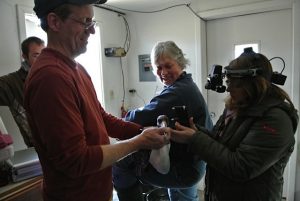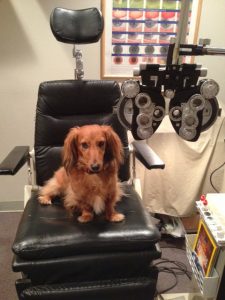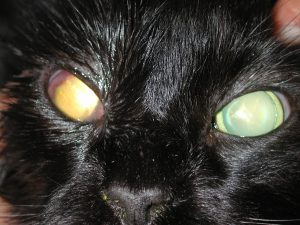 Dr. McLellan’s lab is focused on solving ocular problems that affect animals and humans, with a particular emphasis on glaucoma. Her lab is uniquely positioned to apply the principles of “One Health” to vision research, by virtue of her joint faculty appointments as an Associate Professor of Comparative Ophthalmology in both the School of Veterinary Medicine – where she sees clinical veterinary patients, teaches veterinary students and trains Residents in Comparative Ophthalmology– and Department of Ophthalmology and Visual Sciences, School of Medicine and Public Health, where her research laboratories are based. A vital component of her research is the strong collaborative relationships that exist between her laboratory, other members of the vision research community in the Glaucoma Research Group and the McPherson Eye Research Institute and other clinicians and collaborators in the School of Veterinary Medicine, School of Medicine and Public Health and the College of Engineering.
Dr. McLellan’s lab is focused on solving ocular problems that affect animals and humans, with a particular emphasis on glaucoma. Her lab is uniquely positioned to apply the principles of “One Health” to vision research, by virtue of her joint faculty appointments as an Associate Professor of Comparative Ophthalmology in both the School of Veterinary Medicine – where she sees clinical veterinary patients, teaches veterinary students and trains Residents in Comparative Ophthalmology– and Department of Ophthalmology and Visual Sciences, School of Medicine and Public Health, where her research laboratories are based. A vital component of her research is the strong collaborative relationships that exist between her laboratory, other members of the vision research community in the Glaucoma Research Group and the McPherson Eye Research Institute and other clinicians and collaborators in the School of Veterinary Medicine, School of Medicine and Public Health and the College of Engineering.
Improving Ophthalmic Diagnostic Tests in “Special Species”
 Dogs and cats are not the only species kept as pets. As more and more people share their lives with less conventional species, there is a need to improve understanding of both eye diseases and normal ocular features of these critters. One area of special interest to our lab is the assessment of methods for measuring intraocular pressure in a range of species. Most recently, Resident Kevin Snyder worked with Dr. Christoph Mans, a veterinarian specializing in “special species” at UW Veterinary Care, to test the accuracy of various different commercially available tonometers in chinchillas! Dr. McLellan has also collaborated with Lab student alumna, Dr. Jessica Lovstad and Dr. Gamble, the veterinarian at Lincoln Park Zoo in Chicago, to help establish normal ranges of intraocular pressure in a wide range of species.
Dogs and cats are not the only species kept as pets. As more and more people share their lives with less conventional species, there is a need to improve understanding of both eye diseases and normal ocular features of these critters. One area of special interest to our lab is the assessment of methods for measuring intraocular pressure in a range of species. Most recently, Resident Kevin Snyder worked with Dr. Christoph Mans, a veterinarian specializing in “special species” at UW Veterinary Care, to test the accuracy of various different commercially available tonometers in chinchillas! Dr. McLellan has also collaborated with Lab student alumna, Dr. Jessica Lovstad and Dr. Gamble, the veterinarian at Lincoln Park Zoo in Chicago, to help establish normal ranges of intraocular pressure in a wide range of species.
Initial Steps Towards Reducing Canine Glaucoma Incidence
 Veterinary Ophthalmologists and dog owners and breeders rightly fear glaucoma in their canine patients and companions. Glaucoma in dogs is a formidable adversary, that often causes severe pain and can rob affected dogs of sight in a matter of hours. In this respect, the disease in dogs most resembles acute angle closure glaucoma in people. While medical and surgical advances enable us to preserve vision in some of our canine glaucoma patients for months or even years, these treatments do have high complication rates. A range of dog breeds are over-represented in our clinical glaucoma caseload at UW Veterinary Care and we are actively working to help discover and understand genes responsible for susceptibility to glaucoma in several breeds including the Siberian Husky and Basset Hound. We currently collaborate with Dr. Peter Muir at the University of Wisconsin-Madison, Dr. Markus Kuehn at the University of Iowa, dog breeders, breed clubs and several veterinary ophthalmologists throughout the USA, as well as leveraging the unique resources maintained by Dr. Leandro Teixeira and our colleagues in the Comparative Ocular Pathology Laboratory of Wisconsin (COPLOW). Learn more about glaucoma in dogs here. If you own a Siberian Husky, learn how your dog might help our research here.
Veterinary Ophthalmologists and dog owners and breeders rightly fear glaucoma in their canine patients and companions. Glaucoma in dogs is a formidable adversary, that often causes severe pain and can rob affected dogs of sight in a matter of hours. In this respect, the disease in dogs most resembles acute angle closure glaucoma in people. While medical and surgical advances enable us to preserve vision in some of our canine glaucoma patients for months or even years, these treatments do have high complication rates. A range of dog breeds are over-represented in our clinical glaucoma caseload at UW Veterinary Care and we are actively working to help discover and understand genes responsible for susceptibility to glaucoma in several breeds including the Siberian Husky and Basset Hound. We currently collaborate with Dr. Peter Muir at the University of Wisconsin-Madison, Dr. Markus Kuehn at the University of Iowa, dog breeders, breed clubs and several veterinary ophthalmologists throughout the USA, as well as leveraging the unique resources maintained by Dr. Leandro Teixeira and our colleagues in the Comparative Ocular Pathology Laboratory of Wisconsin (COPLOW). Learn more about glaucoma in dogs here. If you own a Siberian Husky, learn how your dog might help our research here.
Our studies have been generously funded by grants from the Vision for Animals Foundation; the Canine Health Foundation (American Kennel Club); the Marfan Foundation, and UW-Madison’s Companion Animal Fund.
Feline Herpesvirus-1: Finding New Weak Spots in the Common Virus that Causes Debilitating Disease in Cats
 Unlike glaucoma which is not a common disease in cats, Feline herpesvirus-1 is an extremely widespread infectious cause of painful and debilitating eye and respiratory disease in cats and is a major health problem encountered in cats in animal shelters in the USA and worldwide. In severely affected cats, anti-viral medications can be used but these vary in their effectiveness and safety, and response to treatment can be difficult to predict in individual patients.
Unlike glaucoma which is not a common disease in cats, Feline herpesvirus-1 is an extremely widespread infectious cause of painful and debilitating eye and respiratory disease in cats and is a major health problem encountered in cats in animal shelters in the USA and worldwide. In severely affected cats, anti-viral medications can be used but these vary in their effectiveness and safety, and response to treatment can be difficult to predict in individual patients.
Dr. McLellan and Dr. Andrew Lewin (a former Resident in Comparative Ophthalmology at the School of Veterinary Medicine) conducted an in-depth, state-of-the-art genetic study of this troublesome virus. Working together with a team of colleagues and collaborators, including internationally recognized virologists Dr. Curtis Brandt and Kristen Barnard; veterinary ophthalmologist, Dr. Ellison Bentley, and Shelter Veterinarians throughout the USA led by Dr. Sandra Newbury, our goal was determine the genetic makeup of different strains of Feline herpesvirus-1 isolated from cats with eye and respiratory disease. Dr Lewin is continuing this work as a faculty member at Louisiana State University, to determine how differences in the DNA of virus strains may account for variation in clinical severity of disease or response to anti-viral medications. Better understanding of this virus at a genetic level will enable the future development of more effective prevention and treatment measures, to limit illness, pain and discomfort in the cat population at large.
This work was supported by the School of Veterinary Medicine’s Companion Animal Fund.